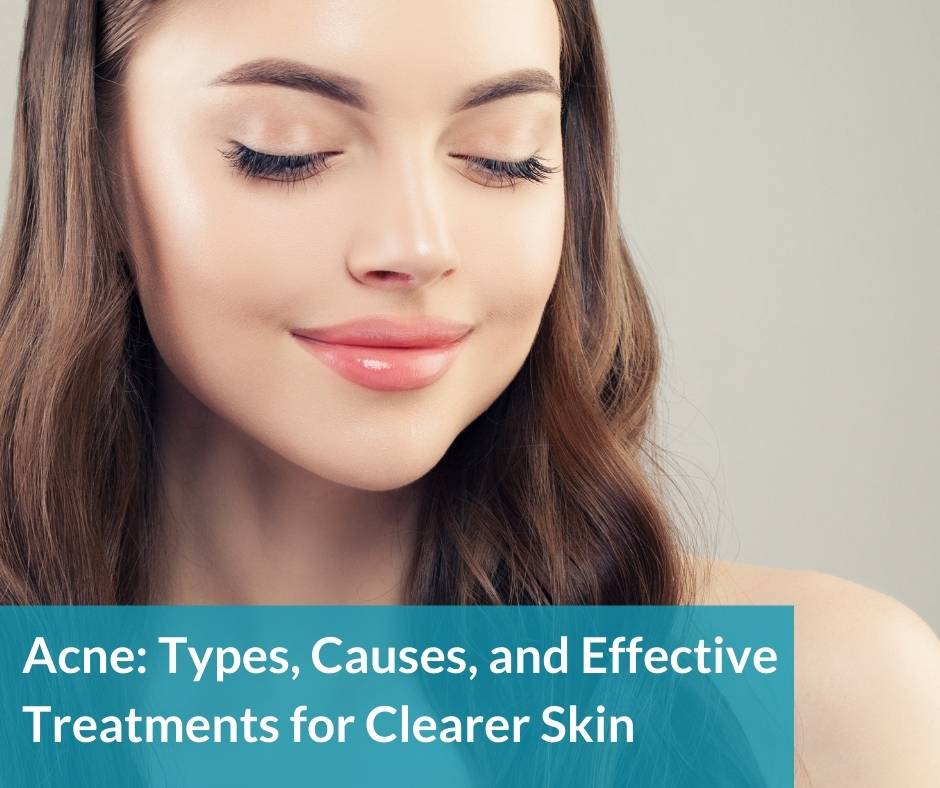All You Need to Know About HyperpigmentationHyperpigmentation is a condition that causes skin discoloration in multiple areas of the body, including the face. This can affect people regardless of their skin color and age. If you or a loved one have hyperpigmentation, you may be curious about the treatments available and how they create a more even skin tone. We’ll cover both points In this guide, as well as other essential details on hyperpigmentation. What is Hyperpigmentation?Hyperpigmentation causes skin to look darker in certain areas than in others. This may manifest in small, isolated zones or bigger areas — even covering the whole body. Hyperpigmentation isn’t dangerous, but could be a symptom of an underlying condition that requires medical attention. People can be affected by different types of hyperpigmentation. Liver spots (also known as sunspots) are caused by an excessive amount of exposure to direct sunlight, particularly in areas touched by UV radiation frequently (such as the face, hands, and back). This is fairly common in individuals who work outside for long stretches, especially without suitable clothing or sunscreen. Melasma is a form of hyperpigmentation most commonly associated with pregnant women, due to their fluctuating hormones. Their melasma may clear up after they give birth, though they could still require treatment much later. Why Do I Have Hyperpigmentation?Hyperpigmentation is due to excessively high levels of melanin in the body: this is the pigment that determines the color of your skin. Sunlight can increase melanin production, as the body tries to darken the skin to protect itself against sun exposure. Skin inflammation can also lead to a boost in pigment production, as a result of a condition like eczema or acne. This is most common in those with darker skin. Specific medications, including antimalarial or topical treatments, can contribute to hyperpigmentation too. However, this may make discolored patches appear gray rather than brown. Addison’s disease, which affects the adrenal glands, is another potential reason for your hyperpigmentation. Discoloration may occur on the elbows, toes, lips, and knuckles. Other signs of Addison’s disease are nausea, fatigue, and dizziness. Acne, inflammation, or skin injuries can also lead to hyperpigmentation. How Can I Treat My Hyperpigmentation?Astra Medicare offers multiple treatments for hyperpigmentation, including: The Perfect Derma PeelThe Perfect Derma Peel can improve the appearance of hyperpigmentation and melasma. Your skin tone should look more evenly balanced and brighter after the recommended number of treatments. The Perfect Derma Peel will also target:
As a result, your skin will appear smoother and younger. However, the Perfect Derma Peel also encourages stronger production of elastin and collagen. This will leave your skin firmer, clearer, and with a stronger texture. Your skin may feel a little sensitive during the peeling process, but that should fade once the treatment is over. It’s crucial that you avoid direct sunlight, or at least minimize your exposure, for a specific period after Perfect Derma Peel sessions. The specialist performing your peel will provide you with advice to encourage proper healing. You may undergo a follow-up Perfect Derma Peel session after around three or four weeks. Clear + BrilliantClear + Brilliant is an increasingly popular laser treatment for patients with hyperpigmentation. A licensed skin care professional will administer the Clear + brilliant treatment by guiding a handheld laser device over the skin. This can reduce the appearance of common signs of aging and promote healthier, brighter skin with a more even tone. Hyperpigmentation should fade after the recommended number of sessions. Glutathione IV TreatmentInjecting vital nutrients into the bloodstream directly, rather than by taking food or oral supplements, enables them to bypass the digestive process. As a result, the body will absorb more of their goodness than it would otherwise. Glutathione is a natural antioxidant that inhibits production of melanin, the substance that creates the skin’s pigmentation. Our Glutathione IV treatment will leave skin lighter and make hyperpigmentation less visible, so your skin tone will be more balanced. It also improves the appearance of blemishes, freckles, and liver spots. Brightening Radiance FacialThe Brightening Radiance Facial improves skin texture and health to leave it with a noticeable glow. This treatment incorporates a specialized cleansing system and carefully chosen ingredients suited to each skin type. You’ll also receive a gentle massage with quartz stones to tackle puffiness. If necessary, we’ll perform extractions to leave your skin looking even healthier. What Else Can I Do to Treat My Hyperpigmentation?Take Care When in SunlightOne of the most important steps you can take when trying to improve the appearance of your skin is to be aware of sun exposure. Follow the below tips to protect yourself against sun-related hyperpigmentation:
Speak to Your DoctorIf you’re concerned about your hyperpigmentation, consider speaking to your doctor. They may be able to offer recommendations you haven’t thought of yet and put your mind at ease. Your doctor could switch you to a new medication if the one currently prescribed is responsible for your hyperpigmentation. How Can You Find Out More About Effective Hyperpigmentation Treatments?Hyperpigmentation can change the appearance of your skin and cause discoloration in multiple areas. This is most noticeable on the face, but could manifest across the entire body in extreme cases. Astra Medicare’s team can provide you with multiple treatments for your hyperpigmentation, whether you want to feel pampered with a gentle facial or try a powerful peel. Schedule your free consultation with Astra Medicare today!
0 Comments
Acne: Types, Causes, and Effective Treatments for Clearer SkinAcne affects around 20% of Canadians (5.6 million), according to the Canadian Dermatology Association. People tend to develop this condition between the ages of 12 and 24, though it may occur at any stage of life. It usually forms on the face, though it’s common on the back, chest, and shoulders too. Acne can be a painful, severe, and stubborn condition, but various treatments are available. It may lead to scarring in some cases, but this can be treated too. However, trying to find the right treatment for your skin can be difficult — but the Astra Medicare team is dedicated to helping you make the best choice. Join us as we take a look at what causes acne, the different types, how you can treat acne, and how to deal with scarring safely. What Causes Acne?Acne occurs when hair follicles or pores become clogged by a combination of dead skin cells and sebum, a natural oil produced by the sebaceous glands. This oil moisturizes the skin to prevent it from becoming too dry, but it can build up over time. As a result, dead skin cells will clog together inside tiny openings in the skin. The following can also contribute to the development of acne:
The latter cause is one of the main reasons why acne is closely linked with teenagers, as hormones fluctuate throughout this period. What are the Different Types of Acne?There are two main types of acne: inflammatory and non-inflammatory. Doctors and dermatologists will distinguish one from the other based on how inflamed the breakouts appear. Both types of acne can involve:
The most severe cases of acne usually involve cysts and nodules. Inflammatory AcneInflammatory acne occurs when follicles or pores are clogged with bacteria and develop into papules, pustules, or cysts. The immune system targets the bacteria and tries to destroy it, which is why skin in the affected area(s) becomes swollen and red. The severity of inflammatory acne varies from tiny bumps to substantial cysts that may only be removed through surgery. It’s the more severe of the two types, and may lead to pitting or scarring. Non-inflammatory AcneNon-inflammatory acne refers to clogged follicles or pores that become infected by bacteria. This leads to the formation of blackheads and whiteheads. However, non-inflammatory acne generally won’t cause discomfort or swelling. What Creates Acne Scarring and How Can You Avoid It?Acne can create brown or red marks on the skin, while more severe cases may lead to permanent scarring when nodules or cysts pop and the affected tissue is destroyed. Scars will remain visible even when the skin heals. However, you may create acne scars if you squeeze or pick at your spots. It can be difficult to resist the urge to do so, especially when acne becomes painful, but popping pimples may leave an undesirable trace in your skin for decades. You may cover them up with make-up (such as foundation), or you might opt for treatment to reduce the visibility of scars on your face instead. What Treatments are Available for Acne and Acne Scarring?You can try various facial treatments to help fight acne and improve the appearance of acne scarring. People often try the following to combat inflammatory and non-inflammatory acne:
Four of the treatments available at Astra Medicare are: The Perfect Derma PeelThe Perfect Derma Peel is a popular treatment for acne scarring. This chemical peel is packed with powerful ingredients including:
The Perfect Derma Peel can be customized to suit each patient’s personal needs. Clear + BrilliantClear + Brilliant can improve the appearance of tissue affected by acne and make scarring less visible. This is a skin treatment effective enough to combat common signs of aging, either after or before they appear. The laser forms microscopic treatment zones in the skin’s upper layers, and encourages healthy tissue to replace damaged skin. Clear + Brilliant This treatment is administered through multiple sessions lasting between 15 and 20 minutes each (on average). It can make skin look healthier and more youthful. Glutathione IV TreatmentOur Glutathione IV treatment injects glutathione directly into the bloodstream. Glutathione is a natural antioxidant that manages production of melanin, which creates the skin’s pigment. A glutathione boost can promote brighter skin, and areas affected by acne scarring should look healthier overall. Purifying Acne FacialAstra Medicare’s Purifying Acne Facial is ideal for acne-prone skin. It helps bring impurities to the surface of the skin to allow for easier removal. Our specialists only use products designed for sensitive skin, all containing natural, anti-acne ingredients. This facial can cultivate a clear complexion and fight against acne that proves particularly stubborn. How Can You Book Your Consultation for Acne Treatment?The Perfect Derma Peel, Clear + Brilliant, the Purifying Acne Facial, and Glutathione IV treatments are available at Astra Medicare today. Any of these will help acne and acne scarring in specific ways, but should all leave your skin looking better than ever. Our professional team will examine your skin and discuss your needs in detail during a free consultation. This is a valuable opportunity to understand how we can help your acne, how we can treat scarring, and how we can make your skin look younger. We can also recommend other facial treatments to improve the health and appearance of your skin, even after your acne subsides. Contact Astra Medicare now to schedule your consultation and discover the right treatment for your acne. |
AuthorDedicated and passionate Astra Medicare staff. Archives
June 2024
Categories
All
|



 RSS Feed
RSS Feed